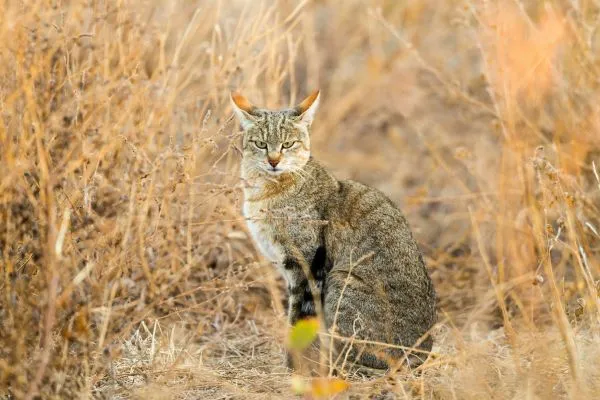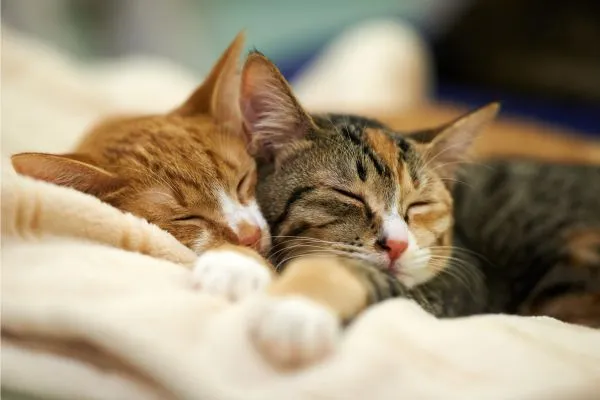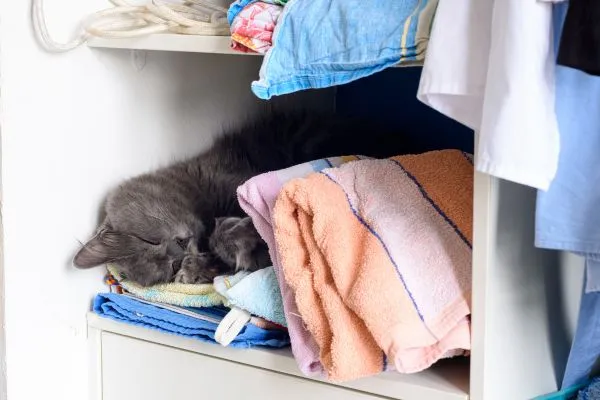Whether it’s curled up on the sofa, basking in a sunbeam through a window or lounging in front of the fire, we’re all familiar with the sight of a snoozing cat. But why is it that our feline friends spend so much time napping... and do they dream while they're asleep?
Why do cats sleep so much?
As Behaviour Officer at Cats Protection Daniel Warren-Cummings explains, the reason can be traced back to the domestic cat’s wild ancestors.
What is the African Wildcat?

While the purring pet in our lives may seem like the picture of domesticity, the reality is that the moggy in our home shares many traits with its wild ancestor, the African Wildcat.
If you were to observe this magnificent creature on its home territory, you’d soon spot many familiar behaviours – most notably the slow, crawling stalk as they hunt prey which can be seen in domestic cats in play. When threatened, the African wildcat will puff out their fur to make themselves seem bigger, just as you may observe when neighbourhood cats are facing off.
And when it comes to sleep, it’s the African Wildcat we can thank for our cat’s need to snooze around the clock.
Do cats need to conserve energy?
One look at their physique and you can see why the African Wildcat is such an effective hunter – the razor-sharp claws, the rotating ears capable of picking up tiny sounds and the agile body built for chasing, pouncing and catching.
So when they’re not stalking their next meal, they’re likely to be indulging in serious shuteye to make sure their energy levels are always fully charged.
However, despite their hunting prowess, as a relatively diminutive mammal, the African Wildcat’s main prey of rodents, birds and small reptiles can make for small portions, which means it must hunt many times a day. All that is hard work, and means the Wildcat needs to conserve energy as much as possible. So when they’re not stalking their next meal, they’re likely to be indulging in serious shuteye to make sure their energy levels are always fully charged.
How many hours do cats sleep?

Just like their wild ancestors, domestic cats will spend much of their time asleep – anywhere between 12 and 18 hours a day is normal, with kittens and older cats likely to need more.
But this instinct to snooze is not only down to conserving energy to hunt, it’s also about self-preservation. Both domestic cats and African Wildcats are by nature solitary animals – and as such lack the ‘pack mentality’ to protect each other. A tired cat is less able to protect themselves, so the African Wildcat will waste no time in topping up on rest when they get the chance.
Where do cats sleep?

This leads on to another fascinating similarity between domestic cats and their wild cousins – the tendency to find nooks and crannies in which to grab a catnap.
As solitary animals, cats can be vulnerable to attack when they’re sleeping, so it makes sense for them to find hiding places, particularly if they’re high up off the ground. So when you next find your cat fast asleep in the airing cupboard or snuggled in a wardrobe, think of the African Wildcat snoozing in a tree or tucked in a rock crevice.
Are cats easily disturbed from sleep?
Ever noticed how your cat can go from fast asleep to wide awake in seconds? That’s another important evolutionary trait inherited from the African Wildcat.
Despite their need for sleep, the African Wildcat can’t afford to miss a hunting opportunity and need to remain alert for predators. So even when they’re fast asleep, their keen sense of smell and superior hearing will be ticking over, ready to jolt them into action as needed.
t’s important not to disturb your cat when they’re sleeping, as if they’re feeling vulnerable, those innate instincts may kick in and they could react by taking a swipe.
Do cats dream?
People often wonder if their cat can dream, and the answer is yes.
When cats are asleep, their brains show similar patterns to the brains of humans when they dream. If their eyes are tightly closed and their whiskers or paws are twitching, there’s a good chance your cat is having a dream.
And just like their owners, cats can also snore, snuffle and shuffle about in their sleep. As they fall asleep, the soft palate relaxes and this results in those gentle snoring sounds some owners report.
Find out more feline facts
Check out our expert guides to a range of questions about cats, including how long do cats live?, how to stop cats scratching furniture and how to teach a cat tricks.